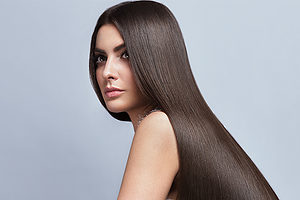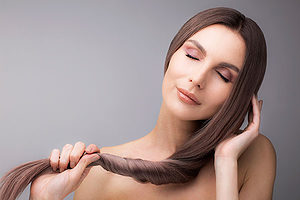For many people, hair oiling is a tradition passed down from their parents and grandparents. Scalp massages with coconut oil or almond oil increase blood circulation, hydrate the hair shaft, prevent hair thinning, and minimize hair breakage. (1)
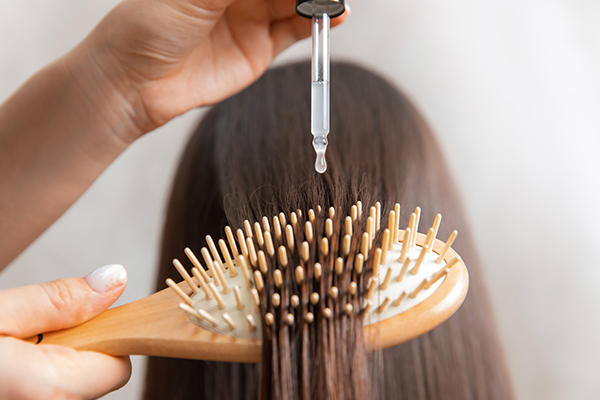
Oiling also safeguards the hair from damage by penetrating the hair and reducing the amount of water it absorbs. (1)
Moreover, oiling helps the scalp remain clean and free from dandruff and other scalp infections when hair oils that have antifungal properties are used. (2)
Article Contents
How Frequently Should You Oil Your Hair?
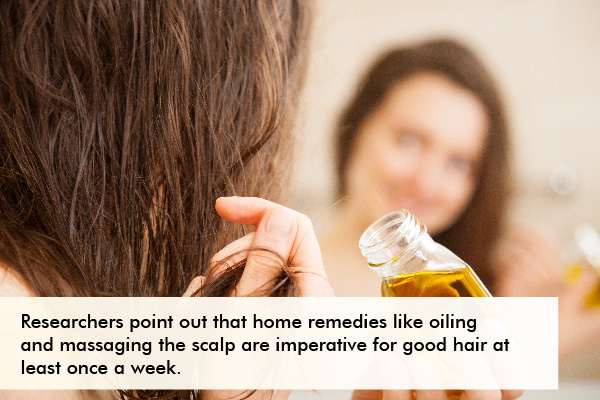
The frequency of oiling your hair depends upon how often you wash it and your hair type. For instance, dry and brittle hair will need more frequent oiling than oily hair.
Research studies indicate that oiling your hair once or twice a week would be enough to hydrate it. You should not oil your hair daily as that could disturb the natural oil production of your scalp and you could end up having greasy or dry strands. (3)
According to one research, massaging your hair twice a week will strengthen your hair, especially if you often use straighteners, curlers, and chemical treatments. (4)
Researchers also point out that oiling and massaging the scalp are imperative at least once a week. However, it could be done twice a week if you use aloe vera oil, coconut oil, or mustard oil. (5)
How Should You Oil Your Hair?
You should oil your hair only when the scalp is clean. You will need to apply the hair oil to your scalp and hair and massage it for 5–10 minutes in circular motions. Then, you need to comb and braid your hair before shampooing. (3)
Some experts believe that applying a coat of oil to the hair before shampooing is a protective measure; the oil lubricates the shaft, thus making your tresses more manageable and easier to comb. (2) However, you should leave the oil on your hair for at least 1 hour.
Coconut oil is easily absorbed in the hair cuticles, and thus it can be used as a hair conditioner. (6)
Benefits of Oiling the Hair
Here are the benefits of oiling your scalp and how often you should do it.

1. Prevents premature graying of hair and protects the strands
Research studies indicate that regular massaging and soaking your hair strands in a top-quality hair oil will ensure the antioxidants in it prevent graying and aging of hair and keep it shiny and healthy. (3)
2. Reduces scalp inflammation and fungal infections
Regular application of antimicrobial oils such as coconut oil and olive oil to your scalp can inhibit microbial activity and supply it with the nutrients needed to keep the hair hydrated and healthy. (3)
3. Prevents dandruff
Dandruff on the scalp can be further aggravated by scalp dryness, and so regular scalp massages using oils with antimicrobial activity can help prevent dandruff and related disorders.
You can also apply essential oils such as tea tree oil and lavender oil mixed with a carrier oil such as jojoba oil to your hair and scalp to promote hair growth and manage dandruff and seborrhea.
A 2021 study documented the benefits of applying coconut oil to the scalp and suggested that its regular use is effective in controlling dandruff and other hair infections. (7)
4. Protects from sunlight
Some hair oils contain properties that protect the hair shaft from sunlight and UV damage that retards hair growth. Coconut oil is the best hair oil for protecting the hair and scalp from the harsh environment and pollution. (8)
5. Provides sheen
Regularly oiling your hair keeps it hydrated and shiny. Research studies published in 2019 stated that hair oil acts as a prewash conditioner that protects the hair cuticles and makes them look smooth and shiny.
However, note that adding too much oil to the scalp can also cause adverse effects. (6)
6. Helps hair growth and builds hair protein
Nutrient-rich oils such as coconut oil penetrate the scalp, providing it with adequate nutrients. Moreover, oil-soluble substances on the scalp dissolve when it is gently massaged with hair oil.
Oil massages also improve blood circulation, and the nutrients are transported to the deeper layers of the hair and blood capillaries and to the cells involved in protein synthesis, thus promoting hair growth. (5)
Regular oil massages on the scalp can improve blood circulation to the hair follicles, resulting in thicker and shinier hair, according to research studies. (4)
7. Soothes the body and mind
Regularly oiling the scalp before washing it and keeping a hot towel wrapped around the head for 20–30 minutes will help improve oil absorption and strengthen the hair roots. (4)
What Oil Should You Use to Oil the Scalp?
Dermatologists are frequently asked what hair oil should be used to battle hair care problems; hence, it is essential to know the properties of commonly used hair oils such as almond oil, coconut oil, amla oil, and castor oil. (3)
Coconut oil penetrates the scalp more than other oils and is able to get rid of scalp bacteria and fungi due to its antimicrobial activity.
Almond oil, amla oil, and castor oil are rich in fatty acids and nutrients essential for hair growth and can be used to massage the scalp twice a week.
General Queries Related to Oiling Your Hair
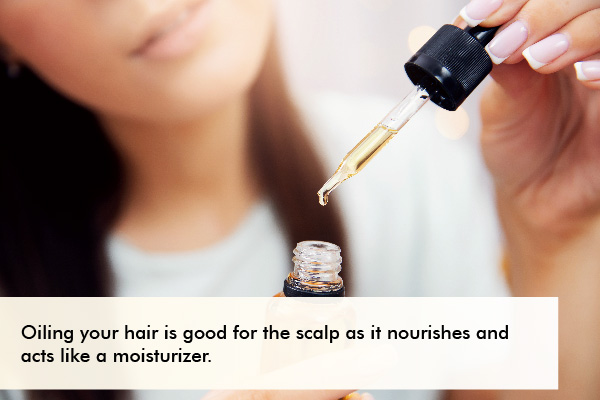
Is oiling your hair good for the scalp?
Yes, it nourishes the scalp and acts like a moisturizer. (5)
Is a hot oil treatment beneficial for the hair?
Yes, it should be done twice a month, as it adds moisture and bounce to the hair. (9)
Can oiling the hair damage it?
Hair oiling can damage your hair if it is not done in the right way. For instance, vigorous massaging can lead to hair problems. (10)
Do sensitive scalps develop irritation after applying hair oils?
Scalp reactions can vary depending upon the sensitivity of your scalp. They are more common and intense in people with a dry or greasy scalp. (10)
Final Word
Oiling your hair offers several benefits, and the primary function of the hair oil is to act as an emollient. Different hair oils contain unique properties that offer various positive effects. (3)
According to research, you must oil and massage your scalp and hair at least twice a week with aloe vera, coconut oil, or mustard oil. (5)
Don’t apply oil daily because everyday washing of the hair can be damaging to the hair shaft and scalp due to the harsh surfactants in shampoo.
References
- Gavazzoni Dias MFR. Hair cosmetics: An overview. International journal of trichology. https://www.ncbi.nlm.nih.gov/pmc/articles/PMC4387693/. Published 2015.
- Monselise A, Cohen DE, Wanser R, Shapiro J. What ages hair? International journal of women’s dermatology. https://www.ncbi.nlm.nih.gov/pmc/articles/PMC5419032/. Published February 16, 2017.
- Mysore V, Arghya A. Hair oils: Indigenous knowledge revisited. International journal of trichology. https://www.ncbi.nlm.nih.gov/pmc/articles/PMC9231528/. Published 2022.
- Ijraset. IJRASET Journal for Research in Applied Science and Engineering Technology. Formulation and Evaluation of Polyherbal Hair Oil. https://www.ijraset.com/research-paper/formulation-and-evaluation-of-polyherbal-hair-oil.
- Demedicalizing Women’s Health”. – researchgate. https://www.researchgate.net/publication/277005327/.
- Mysore V, Parthasaradhi A, Kharkar RD, et al. Expert consensus on the management of Telogen Effluvium in India. International journal of trichology. https://www.ncbi.nlm.nih.gov/pmc/articles/PMC6580807/. Published 2019.
- Saxena R, Mittal P, Clavaud C, et al. Longitudinal Study of the scalp microbiome suggests coconut oil to enrich healthy scalp commensals. Scientific reports. https://www.ncbi.nlm.nih.gov/pmc/articles/PMC8012655/. Published March 31, 2021.
- Maduri VR, Vedachalam A, Kiruthika S. “Castor oil” – the culprit of acute hair felting. International journal of trichology. https://www.ncbi.nlm.nih.gov/pmc/articles/PMC5596646/. Published 2017.
- Black hair: Tips for everyday care. American Academy of Dermatology. https://www.aad.org/public/everyday-care/hair-scalp-care/hair/care-african-american.
- Godse K, Zawar V. Sensitive scalp. International journal of trichology. https://www.ncbi.nlm.nih.gov/pmc/articles/PMC3500070/. Published April 2012.






